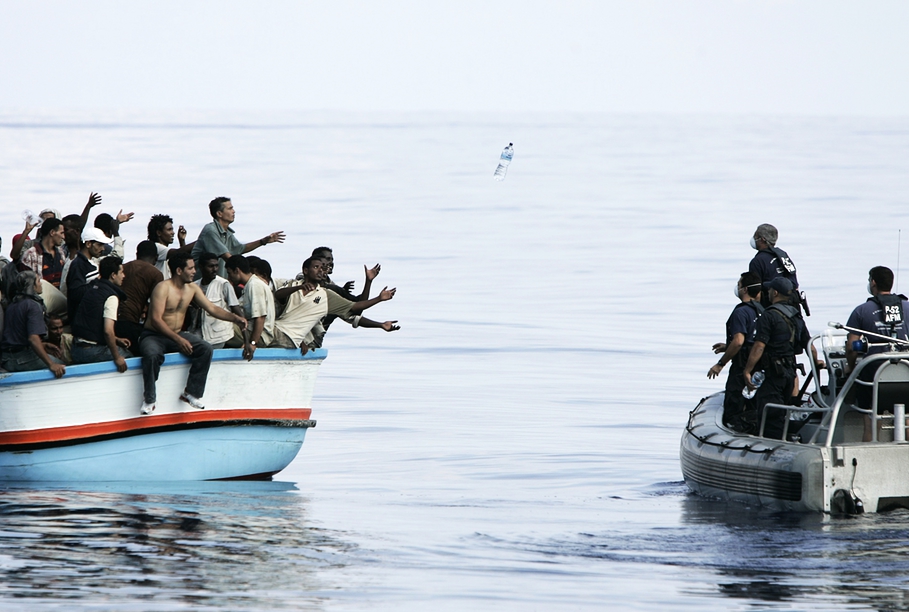The idea of a quota-based system for distribution of Mediterranean asylum-seekers among European Union member states is much like the boats these people use to cross from North Africa to Southern Europe. Such proposals never sink for ever: despite being torpedoed one day by some EU members, they resurface the next morning flying slightly different colors.
It is clear why: no politician who takes Western humanitarian values seriously can sit idly by the TV, watching people drowning by the hundreds. But he or she must also invent a way of 'defending' their own particular homeland from the people in question, while avoiding a complete loss of face. Hence the rhetoric employed by Latvia, Estonia and the Czech Republic of supporting “voluntary” quotas, as if everyone else might take in the refugees before they have a chance to be sent here.
It’s obvious that some type of distribution system will be established, and pure logic tells us that it will have quotas at its core, be they implicit or explicit. The latter is preferable: it’s always better to clearly know who owes what and to whom, otherwise the risk of another Greek-style imbroglio becomes dangerously high.
Besides, such a clearly defined mechanism offers some opportunities for using it in really innovative and creative ways. There have already been some interesting ideas, like setting up a pan-European refugee-quota exchange, much like the carbon emission market.
While it might initially seem reminiscent of a slave market, the key difference would be that a 'commodity' purchased on such an exchange would not grant its owner a right to do something, but rather a right to do nothing. Some fine-tuning of rules could even open this 'marketplace' up for non-EU nations as well.
To put it bluntly – if Europeans are ready to pay for sending hazardous waste abroad for reprocessing (or simply dumping it in some out-of-the-way place), they should be easily persuaded to pay a little more for diverting the flow of migrants away from their shores. Besides, such an approach would create an added value by channeling euros to poorer lands and making global distribution of wealth more even.
And in this context the proposal promoted recently by Latvian MEPs Artis Pabriks and Krisjanis Karins, should be taken serously. Both MEPs proposed lessening any would-be quota for Latvia on historic grounds, pointing to post-Soviet non-citizens residing in Latvia as de facto immigrants - in the country but not integrated.
However, a quota is a number, а figure, that has to be calculated precisely one way or another - preferably, via a simple equation. The system mulled previously by eurocrats would take into account the level of economic development of a host state: the lower its GDP per person is, the more people are deducted from its quota. In math this is called a “reduction factor”. In effect, Karins and Pabriks are offering to insert a second reduction factor into the quota equation, though they have yet to suggest the complete computational formula.
But it should be pretty easy to factor in non-citizens: count all of them as immigrants, in contrast to citizens of 'minority' origin who fall outside the parameters (regardless of what the Preamble to the Constitution says).
Even so, Mr Pabriks has gone further, adding that some naturalized citizens are “still migrants in the first or second generation.” This is the key, the importance of which even Pabriks himself may be unaware.
From this point on, it’s pure and simple math: if one non-citizen or naturalized citizen is equal to one migrant, then a second-generation citizen counts as a half-migrant, third-generation – as quarter-migrant et cetera et cetera. Even seemingly insoluble cases concerning precisely how 'Latvian' kids are produced from the interbreeding of citizens and non-citizens, could be solved by adopting this practical approach.
Those squeamish souls who might smell something of the Nuremburg Laws in such a method should be reassured by reference to Israel’s Law of Return. It might also be worth amending Latvia’s naturalization law which currently still stipulates that all citizens are equal regardless of how they obtained citizenship.
This is easily done, as the addition of the Preamble to the Constitution again shows.
Once this minor obstacle will be removed, non-citizens and their offspring will have a chance to become one of the most valuable export commodities produced in Latvia. That, in turn, will help spread greater prosperity and, ultimately, harmony throughout the land.































